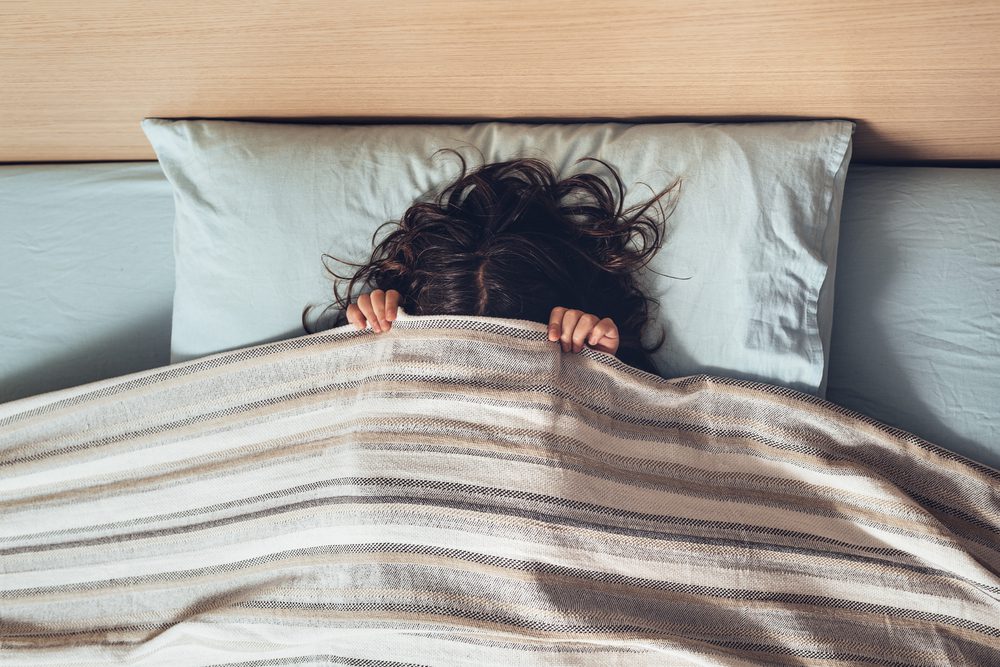Nightmares are dreams that contain distressing themes of fear, guilt, and anxiety. Although nightmares and bad dreams may seem like the same thing, only nightmares cause the sleeper to wake up out of sleep. It’s common to wake up from a nightmare remembering details of the dream and still feeling distressed.
Having occasional nightmares is common. Around 85% of adults report having at least one nightmare in the last year. Frequent nightmares are less common, and only 4 to 10% of people report having one or more nightmares each week. Nightmares are more common in women, children, and people diagnosed with a range of mental health conditions.
There is no consensus regarding why people have nightmares. Researchers suggest that these distressing dreams occur as the body attempts to integrate memories, regulate mood, and process waking experiences. Some researchers hypothesize that nightmares are an intense expression of these normal processes, while others hypothesize that nightmares represent a breakdown of normal processes.
Although many nightmares are idiopathic, meaning they have no known cause, research has identified several nightmare triggers. Learning about nightmare triggers, as well as health conditions in which nightmares are a common symptom, is helpful for anyone looking to reduce the frequency of these frightening dreams.
Top 5 Tips to Prevent Nightmares

- 1 Find ways to reduce stress before bedtime.
- 2 Talk it out with a friend or journal about what you’re experiencing.
- 3 Improve your sleep routine and keep a regular sleep schedule.
- 4 Avoid large meals right before bed.
- 5 Prioritize your mental health and seek professional counseling.
Don’t be afraid to ask for help if you’re having frequent nightmares.
Stress
Nightmares are more frequent during periods of stress and major life transitions. Research has shown that the content of dreams often reflect sources of daytime stress. While this might be unsettling at first, some researchers suggest that nightmares may actually help to alleviate stress. These researchers suggest that many nightmares represent the body’s attempt to positively cope with daytime stressors.
Mental Health Conditions
Nightmares are associated with a variety of mental health conditions, including depression, general anxiety disorder, bipolar disorder, schizophrenia, and post-traumatic stress disorder (PTSD). Nightmares are a characteristic symptom of PTSD, affecting as many as 72% of people with this condition. For many people with PTSD, nightmares involve painfully reliving traumatic experiences and often contain themes of helplessness and lack of control.
Medications and Supplements
Certain medications are associated with an increased risk of nightmares. Medications linked to nightmares include antidepressants, narcotics, and barbiturates. Stopping or withdrawing from some medications can also lead to nightmares.
Numerous medications, including barbiturates and benzodiazepines, reduce the amount of deep REM sleep a person gets each night. When someone stops taking these medications, the body may experience what’s called a “REM rebound“. During a REM rebound, the body attempts to catch up on lost REM sleep. Because most nightmares occur during REM sleep, people experiencing REM rebound are at an increased risk of vivid dreams and nightmares.
Melatonin is a sleep-promoting hormone naturally produced by the body. Many people also take melatonin as an over-the-counter sleep aid. While some individuals have reported nightmares after taking melatonin supplements, there is little research that discusses this potential side effect. One potential explanation is that melatonin supplements have been shown to increase REM sleep, which means there are more opportunities each night for nightmares and other vivid dreams.
Sleep Disorders
Several sleep disorders are associated with an increased risk of nightmares, including insomnia, obstructive sleep apnea, sleep related movement disorders, and narcolepsy. Nightmares are reported in about 17% of people with chronic insomnia and 33% of people diagnosed with narcolepsy.
When recurrent nightmares interfere with a person’s ability to function during the day, they may be diagnosed as nightmare disorder. Nightmare disorder is a type of sleep disorder called a parasomnia. Night terrors are another type of parasomnia that involve nightmares. People experiencing a night terror may move their body and show signs of panic during sleep, like kicking, flailing, or even screaming.
Eating Before Bed
Eating too close to bedtime may increase the risk of nightmares. In one study, 9.5% of people reported that eating late affects the contents of their dreams. It’s unclear if the meal itself leads to nightmares or if there’s something else that explains this relationship.
Tips for Reducing Nightmares
Understanding the cause of nightmares is an important step to reducing their frequency. While occasional bad dreams are unavoidable, several strategies may be helpful in reducing more frequent nightmares:
- Reduce stress: Decreasing stress and worry may be the most effective way to reduce nightmares. Finding ways to cope with stress, like regular exercise, pursuing hobbies, and taking time to relax may be helpful places to start.
- Express yourself: Although it may be tempting to ignore stress, research suggests that suppressing thoughts may actually increase the frequency of nightmares. Instead of ignoring worrisome thoughts or dreams, try to find a way to express them. Consider starting by talking to a friend or creating a piece of art that allows your brain opportunities to process your experience.
- Keep a regular sleep schedule: Routine and quality sleep go hand-in-hand. Improve your sleep hygiene by creating a sleep-promoting routine. One of the most important aspects of good sleep hygiene is going to sleep at the same time every day, even on the weekends. You may even consider making some bedroom upgrades to get better sleep.
- Get support for PTSD: If you experience regular nightmares related to trauma, or if you’ve been diagnosed with PTSD, it’s vital to get support. Treatment for veterans and civilians can help PTSD symptoms and reduce nightmares. Even your loved one or spouse could benefit from support.
- Avoid meals before bed: Although the science studying food and sleep is far from certain, many professionals suggest avoiding large meals before bedtime. Instead, have dinner a few hours before getting into bed.
Most importantly, don’t be afraid to ask for help if you’re experiencing nightmares. It’s important to talk to a health professional if nightmares are happening more than once a week or if they’re affecting your mood and daytime activities. There are several treatments available for recurrent nightmares, so don’t suffer in silence.
References
Ask the Sleep Doctor
Have questions about sleep? Submit them here! We use your questions to help us decide topics for future articles, videos, and newsletters. We try to answer as many questions as possible. You can also send us an email. Please note, we cannot provide specific medical advice, and always recommend you contact your doctor for any medical matters.







